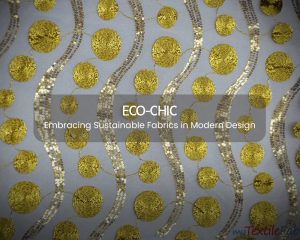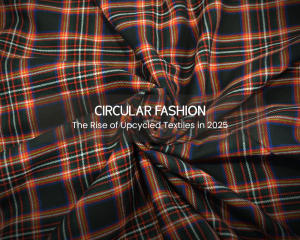My Textile Fabric Launches Technical Textiles for Diverse Industries
Unlike traditional textiles used in fashion or décor, technical textiles are designed with specific performance criteria in mind.
LOS ANGELES, CA, UNITED STATES, May 23, 2025 /EINPresswire.com/ -- Reflecting the evolving needs of modern industries, fabric distributor My Textile Fabric has expanded its offerings to include technical textiles—engineered materials developed to meet performance and durability standards across a range of commercial and industrial applications. This strategic shift supports growing demand for functional fabrics used in construction, healthcare, transportation, agriculture, and environmental management.A Shift from Aesthetic to Functional Materials
Unlike traditional textiles used in fashion or décor, technical textiles are designed with specific performance criteria in mind. These materials may offer resistance to fire, microbes, UV radiation, chemicals, or physical stress. Their purpose-driven design makes them suitable for applications that require more than visual appeal.
Industries such as healthcare, construction, and automotive manufacturing rely on textiles that meet strict safety and quality regulations. These fabrics are used in products like surgical gowns, wound dressings, insulation layers, filtration systems, seat upholstery, and protective garments.
Applications Across Diverse Sectors
Technical textiles are used in sectors such as healthcare, construction, transportation, agriculture, and industrial safety. In medical settings, they support hygiene and protection standards. Construction projects use them for reinforcement and insulation. Automotive and aerospace industries apply them for thermal and acoustic control. In agriculture, they assist with crop protection and soil stability. These materials are chosen for their ability to meet specific performance and regulatory requirements.
Quality Control and Global Sourcing
To ensure compliance and consistency, these materials must meet international standards for strength, durability, and environmental performance. Technical textiles often undergo rigorous testing, including assessments for tensile strength, permeability, and resistance to heat or chemicals.
The company works with suppliers from across the globe, focusing on manufacturers who produce certified technical fabrics. This approach helps ensure that clients across sectors can source reliable materials for critical applications.
Investing in Capability and Knowledge
Entering the technical textiles market requires specialized knowledge. The company is expanding its internal expertise through technical training and industry engagement to support clients with informed material recommendations. It is also exploring opportunities to participate in sector-specific events and trade shows that focus on performance-based fabrics.
This ongoing investment enables the organization to meet the expectations of industries that require precise specifications, documentation, and technical support.
Sustainability and the Future of Technical Textiles
As global industries aim to reduce environmental impacts, the demand for sustainable materials is extending to technical textiles. New developments include fabrics made from recycled polymers, biodegradable composites, and water-saving production techniques.
These environmentally conscious materials align with sustainability goals in industries such as construction, agriculture, and healthcare—sectors increasingly focused on minimizing ecological footprints without compromising functionality.
A Strategic Expansion for Modern Needs
The introduction of technical textiles marks a significant milestone, supporting industries that rely on performance-driven materials for safety, efficiency, and innovation. This evolution reflects broader changes within the global fabric market, where utility, durability, and compliance are becoming central to material selection.
By expanding its product range to meet the evolving demands of modern applications, the company contributes to a textile economy that balances advanced function with sustainable practice.
About My Textile Fabric
My Textile Fabric is a fabric vendor and distributor based in Los Angeles, California, offering a wide range of textiles for apparel, events, interiors, and industrial use. With sourcing partners in Japan, Korea, China, India, Pakistan, and the U.S., the company supplies both decorative and technical fabrics tailored to diverse industry needs.
Media Contact:
My Textile Fabric
https://mytextilefabric.com/
INFO@MYTEXTILEFABRIC.COM
Free 800-939-9266
Local 213-468-8388
Omid Yasharpour
My Textile Fabric
+1 800-939-9266
info@mytextilefabric.com
Visit us on social media:
LinkedIn
YouTube
Other
Legal Disclaimer:
EIN Presswire provides this news content "as is" without warranty of any kind. We do not accept any responsibility or liability for the accuracy, content, images, videos, licenses, completeness, legality, or reliability of the information contained in this article. If you have any complaints or copyright issues related to this article, kindly contact the author above.
Comprehensive Report on the Plant-Based Protein Market: Opportunities and Challenges
Pea Protein Ingredients Industry Report: Competitive Landscape and Future Prospects
Food Preservatives Market Trends and Analysis by Application, Vertical, Region, and Segment Forecast to 2029
Więcej ważnych informacji
 Jedynka Newserii
Jedynka Newserii

 Jedynka Newserii
Jedynka Newserii

Polityka

D. Joński: Nie wiemy, co zrobi Rosja za dwa–trzy lata. Według duńskiego wywiadu może zaatakować kraje nadbałtyckie i musimy być na to gotowi
Zdecydowana większość krajów unijnych wskazuje na potrzebę wzmocnienia zdolności obronnych Europy w obliczu coraz bardziej złożonego geopolitycznego tła. Wywiady zachodnich państw wskazują, że Rosja może rozpocząć konfrontację z NATO jeszcze przed 2030 rokiem. Biała księga w sprawie obronności europejskiej „Gotowość 2030” zakłada m.in. ochronę granic lądowych, powietrznych i morskich UE, a sztandarowym projektem ma być Tarcza Wschód. – W budzeniu Europy duże zasługi ma polska prezydencja – ocenia europoseł Dariusz Joński.
Transport
Duże magazyny energii przyspieszą rozwój transportu niskoemisyjnego w Europie. Przyszłością może być wodór służący jako paliwo i nośnik energii

Zmiany w europejskim transporcie przyspieszają. Trendem jest elektromobilność, zwłaszcza w ramach logistyki „ostatniej mili”. Jednocześnie jednak udział samochodów w pełni elektrycznych w polskich firmach spadł z 18 do 12 proc., co wpisuje się w szerszy europejski trend spowolnienia elektromobilności. Główne bariery to ograniczona liczba publicznych stacji ładowania, wysoka cena pojazdów i brak dostępu do odpowiedniej infrastruktury. – Potrzebne są odpowiednio duże magazyny taniej energii. Przyszłością przede wszystkim jest wodór – ocenia Andrzej Gemra z Renault Group.
Infrastruktura
W Polsce w obiektach zabytkowych wciąż brakuje nowoczesnych rozwiązań przeciwpożarowych. Potrzebna jest większa elastyczność w stosowaniu przepisów

Pogodzenie interesów konserwatorów, projektantów, inwestorów, rzeczoznawców i służby ochrony pożarowej stanowi jedno z największych wyzwań w zakresie ochrony przeciwpożarowej obiektów konserwatorskich. Pożary zabytków takich jak m.in. katedra Notre-Dame w Paryżu przyczyniają się do wprowadzania nowatorskich rozwiązań technicznych w zakresie ochrony przeciwpożarowej. W Polsce obowiązuje już konieczność instalacji systemów detekcji. Inwestorzy często jednak rezygnują z realizacji projektów dotyczących obiektów zabytkowych z uwagi na zmieniające się i coraz bardziej restrykcyjne przepisy czy też względy ekonomiczne.
Partner serwisu
Szkolenia

Akademia Newserii
Akademia Newserii to projekt, w ramach którego najlepsi polscy dziennikarze biznesowi, giełdowi oraz lifestylowi, a także szkoleniowcy z wieloletnim doświadczeniem dzielą się swoją wiedzą nt. pracy z mediami.








![Nestlé w Polsce podsumowuje wpływ na krajową gospodarkę. Firma wygenerowała 0,6 proc. polskiego PKB [DEPESZA]](https://www.newseria.pl/files/1097841585/fabryka-nesquik_1,w_85,r_png,_small.png)




.gif)

 |
| |
| |
|